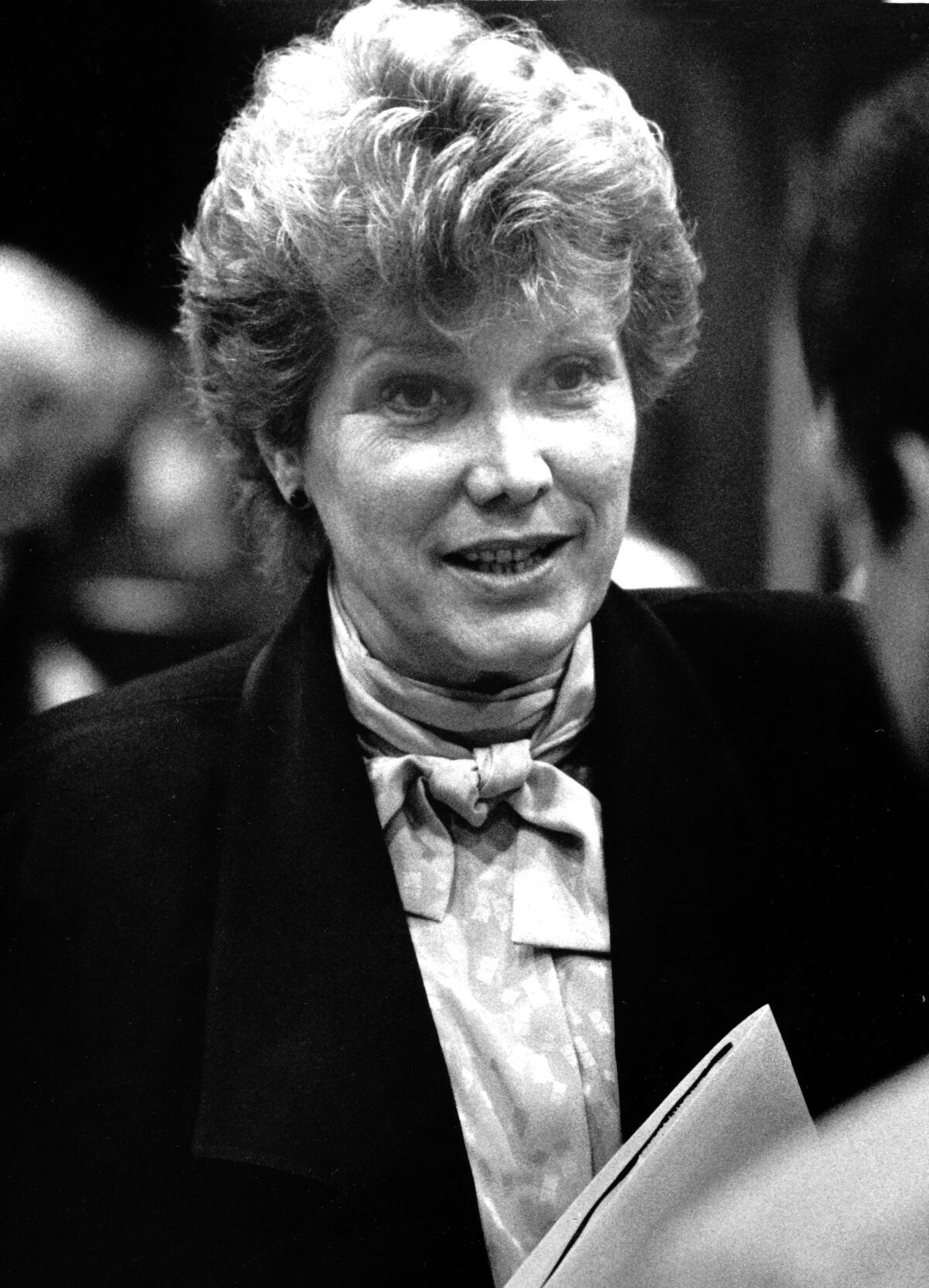Former Councilwoman Joan Milke Flores, who represented San Pedro and Watts, dies at 84

- Share via
Former Los Angeles City Councilwoman Joan Milke Flores, a onetime teenage stenographer for the city who worked her way up at City Hall before winning the Watts-to-San Pedro council seat, died Dec. 19. She was 84.
Flores died of complications from a myelodysplastic syndrome, a blood disorder, said her grandson, Trevor Davis.
The first woman to represent District 15, which comprises the L.A. Harbor and residential and commercial neighborhoods, Flores was known for her loyalty to her district and her push to make city government more transparent.
She navigated a City Council viewed as a “boy’s club,” using canniness and persuasion, rather than shouting or arm-twisting, to get what she wanted. She was a stately woman, a quiet and powerful presence on the council.
“When she raised her microphone to speak, I always wanted to listen,” said longtime politician Gloria Molina, who served on the council alongside Flores. “She was very clear and to the point.”
Joan Milke was born in 1936 in Sheboygan, Wis. Her family moved to California, where she grew up in Highland Park and went to work as a city stenographer after graduating from high school. It was not a traditional path, she said in a 1981 interview with The Times: “In those times, you were successful if you got married and had a family.”
A marriage to Sam Flores, onetime director with the Los Angeles Police Protective League, ended in divorce.
She joined the office of City Councilman John Gibson Jr., a pro-business, pro-growth Democrat who represented District 15 for three decades, in the era before term limits. Flores worked as his secretary and, later, chief deputy.
His retirement in 1981 prompted Flores, then 44, to run for the seat. A Republican, Flores beat a large field in the primary, then defeated John Greenwood, a member of the Los Angeles Board of Education, in a major upset.
Flores served three terms before losing to paint-store owner Rudy Svorinich Jr. amid an anti-incumbent election season that also pushed out Councilwoman Joy Picus, who represented the west San Fernando Valley.
Flores introduced Proposition 5, a ballot measure passed by voters in 1991 that allowed the City Council to override decisions made by the city commissions, whose members are appointed by the mayor. The measure put her at odds with then-Mayor Tom Bradley.
The proposal followed anger over a $1.5-million severance package approved by the Community Redevelopment Agency’s board of commissioners for the agency’s departing administrator.
Supporters of Proposition 5 also argued that the city’s commissions didn’t reflect the makeup of Los Angeles, leaving poorer residents underrepresented.
“I am not sure the most qualified people to serve on commissions are those who have contributed financially to the mayor’s election campaigns or are supporters of the mayor in general,” Flores told The Times in 1991. “If all of the people on these boards and commissions are cut from the same mold as far as economics and politics and everything else, are we really getting the perspective of Los Angeles that we need?”
Proposition 5 “really clarified who was accountable for the decisions that come out of City Hall,” former City Councilwoman Ruth Galanter, who served alongside Flores on the council, recalled in an interview this week.
In a sprawling metropolis that can make us feel like strangers to one another, they were rah-rah homers who made us feel connected to the place — and to each other.
Flores also pushed to televise the City Council’s meetings, which started airing in 1989 on a then-new local station, Channel 35. Some council members turned up with new haircuts at the first meeting that was broadcast. Wardrobes were critiqued by reporters, and there was concern that council members’ speeches would go on endlessly.
Flores felt the broadcasts were important for “citizens to learn more about what their government is doing — not the reaction,” The Times reported.
Flores led the creation of the Alameda Corridor Transportation Authority, a regional board that oversaw the new freight railway, and served as chair. She also gave the corridor linking Los Angeles with its port a new name, Harbor Gateway, to give the community its own identity.
While serving on the council, she ran unsuccessfully for California secretary of State and then for Congress.
Her City Council staff consisted mostly of women who reflected the diversity of her district. On her last day at the City Council, many of them sat in the front row, and “most cried off and on during the meeting,” The Times reported in 1993.
Her former staffers keep in touch and get together to this day, said Ann D’Amato, a onetime Flores deputy.
L.A. County Supervisor Janice Hahn, a former 15th District representative on the City Council, credits Flores with opening doors for women in elective office. “I followed in her footsteps when I was elected to that seat in 2001,” Hahn said.
Flores formed a consulting firm after leaving City Hall and, after retiring, traveled around the world and watched the Dodgers. She remained in San Pedro and enjoyed watching the harbor boats come in, her grandson said.
In addition to her grandson, Flores’ survivors include daughter Valerie Flores, a senior assistant L.A. city attorney; sister Ruth Rinker; and longtime companion Bernie Evans.
More to Read
Sign up for Essential California
The most important California stories and recommendations in your inbox every morning.
You may occasionally receive promotional content from the Los Angeles Times.















